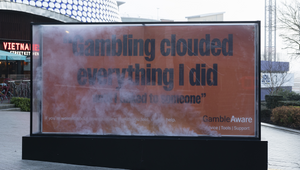
Why Literally Everyone Can Benefit from Dark Horses’ Open-Source Menopause Policy

Does your company have a menopause policy? Don’t worry if you’re stumped by that question. You’re definitely not alone. It’s shockingly rare, as Melissa Robertson, CEO at UK creative agency Dark Horses recently found.
How can that be the case when everybody will be affected by menopausal symptoms, whether directly or through their female colleagues, friends and family, at some point in their lives?
Research by Bloomberg in 2019 showed that 900,000 women in the UK had left jobs because of menopausal symptoms. Yet we don’t talk about it, let alone offer support to those going through this experience. “You've got this huge tranche of brilliant people that you're losing unnecessarily because they're not being helped through it,” says Melissa.
Now there’s no excuse not to offer support though, because Melissa and Dark Horses have created an open source menopause policy that can be downloaded, adapted or improved by anyone to use in their own business. The policy is not just for women going through the menopause, but is designed to be educational, informative and helpful for everyone.
It began with Melissa’s personal experience of menopausal symptoms, which she found were impacting her work in ways we may not expect. Memory gaps, where she forgot even the most basic words, kept plaguing her. She found this embarrassing and frustrating, like playing a permanent game of Articulate trying to find a certain word in a meeting. “It's potentially super humiliating particularly when you're supposed to be leading people.”
Hot flushes unexpectedly struck, causing sudden rushes of heat, often in the face, neck and chest, causing redness and sweating.
The only way to overcome this, Melissa realised, was to explain why it’s happening to people she worked with. Instantly, she felt more supported. In her experience, people weren't as embarrassed as she expected them to be.
Relieved by the effect that even a base level of understanding and honesty brought, she decided to try and encourage more conversation in the industry, writing about it publicly.
The response Melissa got was instant and enthusiastic. As she wrote in a recent statement: “This demonstrated to us that there were a lot of people out there who were relieved to see this issue being openly discussed, who wanted to remove the stigma and improve working life for anyone that menopause affects. Which, in reality, is EVERYONE.”
But the reaction was also disheartening in that not everyone had felt as supported as her. “So many people were saying to me that they’d left their organisations because they didn't feel supported. It's just not on,” she says.
She began wondering whether companies had menopause policies and it turns out there was very little out there. Channel 4 had introduced its Menopause Policy in 2019 and made it public last year. It suggests flexible working, counselling services, paid sickness and desk fans. Publicis.Poke launched a policy in March and added a pledge to break down the taboos of talking about the menopause at work.
Dark Horses didn’t have a menopause policy. So as the CEO going through menopause, she decided to write one.
There were plenty of good starting points from her own experience, such as simply getting people used to being aware of menopausal symptoms. There were quick and easy steps like providing people with desk fans to make sure they can cool off, room for flexible work hours to compensate for disturbed sleep, avoid rush hour on public transport and making times for breaks for people to regain composure. Working remotely during the coronavirus pandemic provoked the thought that people having hot flushes might feel uncomfortable always having their cameras on during video calls.
All of these practical steps found their way into Dark Horses’ final policy document. But Melissa realised early on that the power of something like this isn’t just in the steps it recommends companies take, but building real understanding among people. “Knowledge and understanding will lead to a far greater empathy,” she says.
First Melissa needed to make sure she understood menopausal symptoms herself, beyond what she’d personally experienced. So she undertook an extensive research project. “It took quite a long time to get my head around why it all happened - the hormones side of it,” she says. Reading the finished document, it’s striking just how much human bodies and minds are controlled by levels of hormones.
The finished policy lists three pages of symptoms that women may experience. And in assembling this list Melissa discovered some symptoms she had but had not linked to menopause. She’d randomly found herself more itchy at times, which she learnt was due to a drop in collagen production in the skin. She’d even been slightly worried about getting numb fingers like she’d been out in the cold, irrespective of temperature. It turns out that was a circulatory issue caused by changing levels of hormones. “That knowledge is power and it made me a lot less panicky.” If it put her mind at ease, she knew it would help others.
After she’d made herself a menopause expert, she had her research checked by two GPs as well as a specialist menopausal centre to make sure the simplified science isn’t misleading.
Then she went and wrote the menopause policy, explaining all of this science, listing the symptoms, suggesting policy for people experiencing them and for colleagues and managers, treatment that can help with certain symptoms and support and resources that are already available. She had it designed neatly, with cheerful colours and clear illustrations and no Dark Horses branding on it, so any company can adopt it. Then it was published and made available to any company who wants to adopt it. It can be downloaded here.
In the two weeks since, the response has been encouraging, says Melissa. She’s spoken to clients and other organisations who’ve told her, sheepishly, “this was not on the radar of the business at all.” But many have passed the document onto HR departments so it will be interesting to see which companies integrate it into their company policies.
“Why wouldn’t you now?” is the question Melissa’s asking. She’s done the legwork. She has big hopes on a broad societal scale.
“I definitely want other women to feel as supported as I've felt and not to be afraid, because it's so horrible,” she says. “There are so many things that happened to women that collectively dent our confidence. Some women suffer from terrible period pains, then you go through the child rearing years.” She points to the gender pay gap, which widens starkly as soon as women get to the age when they are most likely to have children.
“I think it's a really stark reminder. Women are hounded out of their organisations because they're made to feel shit it's about not necessarily performing at their peak.”
Menopause is another factor in this broader problem, as Melissa knows first hand. “My greatest fear had been that I'd just be a bit shit. But actually, with everyone's support it's OK. I think I'm firing on lots of cylinders. It doesn't matter if I forget the odd word, it doesn't matter if I have the old hot flush. I know that it's OK to say I need to take a break.”
If the Dark Horses menopause policy is adopted broadly, Melissa hopes that many more women will also experience this freedom. And that has the potential to affect everyone. So why not make a change?













